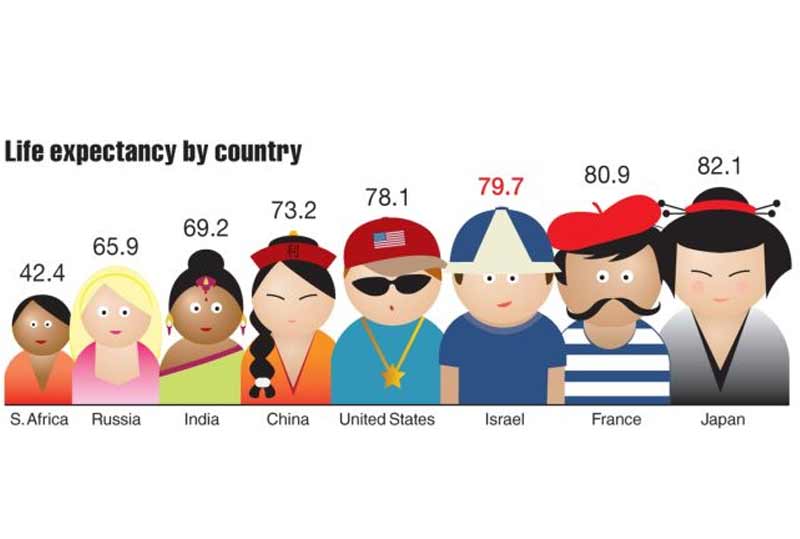Estimated life expectancy future predictions and trends

Can you imagine being young for centuries? The medicine of the future would stop aging, and life expectancy could exceed 1000 years
London-based biomedical gerontologist Aubrey De Gray trained at Cambridge University has been working for years on aging to achieve a life expectancy that could exceed 1000 years or even extend indefinitely, maintaining a youthful appearance and a healthy body. The strategy is to repair tissues and cells so that today’s 40 hopes to live 200 years when they reach their 80s and once that time has passed, add another century thanks to technological evolution, becoming a cycle that It could have no end when it comes to natural death.
Is it possible to stop aging?
From the beginning, the greatest fear of the human being has been death because there were no resources or technologies that would help combat diseases or improve living conditions. With great advances in medicine and the inclusion of tools that make everyday life easier, at the moment the greatest concern of humanity is aging because it seems to be one of the few aspects that escape us of the hands. Diets, magic creams, exercise routines and an obsession to stay young under the social mandate of “The 40 are the new 30”.
Replacing cells and repairing tissues that hypothetically could halt and even reverse old age requires a million-dollar investment in genetic research and technology to materialize. Even if the money is put together to do it, the scientists do not assure that the dream of immortality will ever be fulfilled. However, the idea of De Gray is not so far-fetched when he proposes to treat the organism as if it were an old car, which requires changing its parts and modernizing to keep moving.
How would it be possible to extend life expectancy?
De Gray is developing the program Strategies for Ingenuous Incomprehensible Senescence, which consists of biomedical engineering techniques applied to the restoration of the human body. According to his own opinion published in several media, the biggest problem he faces besides economic resources and the judgment on his credibility is to convince people that they should undergo preventive therapies when they are not too old or sick. Most healthy people in the heyday of their life hardly accept treatments that could initially be invasive, only to venture into the promise of maintaining their health.
The scientist says that aging should be treated clinically from seven corners, beginning with the loss of irreplaceable cells and the accumulation of malignant or unwanted cells. Third and fourth would be to treat defective elements within the cells themselves, as well as mutations of chromosomes and DNA. At a fifth level, the collection of nondigestible molecules – waste – should be solved, and in the sixth, the reservoirs created by these same molecules that block the passage. Finally, we would work on the protein bonds that harden the elastic tissues of the arteries, covering them.
What are the challenges in extending life expectancy?
Beyond money and the development of technologies to take the next step in the clinical trials that are already being done in rodents, one of the main problems is the cure for cancer. Mutations of chromosomes are the most complex slope to solve between the seven legs of the research proposed by De Gray because it would have to manipulate each malignant cell in a laboratory.
In ten years the medicine of the future could inject substances into the body that would work for themselves, but for that, there is a long way to go that not even the scientist himself claims to carry to the end. The idea of living for 1000 years or even forever – unless death is caused by causes other than the aging or deterioration of the body – generates ethical conflicts in the scientific and academic sphere.
If life were to spread for indefinite periods, we would lose the meaning of what we do because we would have the time of the world to make decisions, to repair errors and to be bored with trying alternatives. One of the main arguments against it is that the intervention in aging is opposed to human nature, although it is ambiguous regarding some solutions that are currently offered to maintain a youthful appearance.
On the other hand, in its beginnings, the treatment against old age will be expensive, and only those who have the economic means will have access. There is a debate about who deserves to live for more years because it is hardly the priority of governments in developing countries to keep young people who in many cases do not even have access to basic resources to maintain a decent quality of life. The average Spaniard will probably also not be able to access anti-old-age treatment when it begins to be distributed.
The discussion is set in, experiments are already underway, medicine continues to advance, professions such as the organ designer or nanomedical are created, and although De Gray does not achieve its purpose, mankind will continue to wonder if there is a way to achieve immortality.




